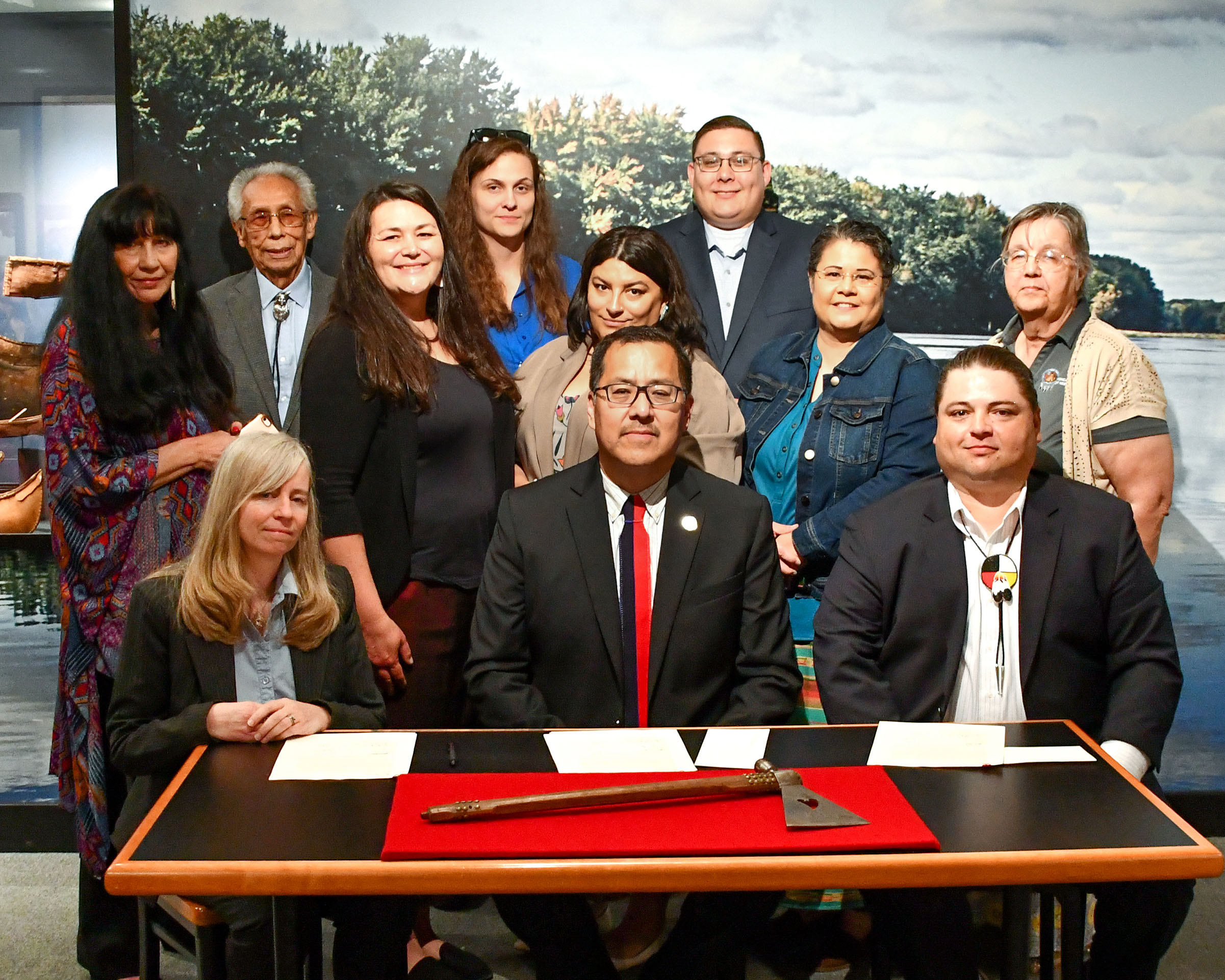
- Details
- By Neely Bardwell
The long-lost pipe-tomahawk that belonged to Chief Standing Bear was finally returned home to the Ponca Tribe of Nebraska on June 3.
Standing Bear is recognized as one of the first civil-rights heroes for Native people. In 1879, he persuaded a federal judge to recognize Native people as persons who are entitled to the right to sue for their freedom. This decision in Standing Bear v. Crook came after Bear sued General George Crook for wrongful imprisonment. Crook had captured and jailed Standing Bear and his band of Poncas in 1877, when, after being forcibly relocated to Oklahoma, they returned to Nebraska to bury Standing Bear’s son.
Several current citizens of the tribe are Standing Bear’s descendants. On June 3, several members of the Ponca Tribal Council and staff visited Harvard University’s Peabody Museum of Archaeology and Ethnology in Cambridge, Massachusetts, to retrieve the pipe-tomahawk. They were joined by members from the Ponca Tribe of Oklahoma to celebrate its return.
The piece of heritage and tradition had been given to John Lee Webster, one of the two lawyers who represented Standing Bear in the Standing Bear v. Crook case. Unfortunately, after Webster died, the pipe-tomahawk was not returned to the tribe’s possession, but sold to a private collector. It changed hands several times before Harvard acquired it in 1982.
Once the Ponca Tribe of Nebraska got wind that the pipe-tomahawk was being held in the Peabody’s collection, they began talking to museum officials about getting it back. Last year, the museum agreed to return it, but COVID-19 prevented the tribe from traveling to Cambridge to repossess it until this month.
Many artifacts from different tribes are still being held in museums across the country. Many have ended up in museum custody through faulty acquisition processes that often go against the wishes of families and communities. Currently, Harvard has around 6,400 Native remains and 13,600 funerary objects.
At the June 3 ceremony, Peabody Museum director Jane Pickering expressed her commitment to do better.
"The Peabody directly benefited from collecting practices that we acknowledge today ignored the wishes and values of families and communities," she said, adding that the museum needs to reflect on and think "about our relationship to affected communities, to try to repair the harm that these practices have caused."
"What's happening here today is what I think we all want to happen, for the Peabody and Harvard not just to do the bare minimum of complying with the law, but to recognize the rightful and moral claims of your sovereign nation," said Shawon Kinew (Ojibwe), a member of the Peabody faculty executive committee.
More Stories Like This
50 Years of Self-Determination: How a Landmark Act Empowered Tribal Sovereignty and Transformed Federal-Tribal RelationsSan Manuel Tribe Reclaims Ancestral Name, Faces Vandalism on Holiday
Minnesota Wild Makes History with First-ever Ojibwe-language NHL Broadcast
NCAI Demands Tribal Consultation Before Transfer of Native Education Programs
Native Pride Productions Brings Tradition to Macy’s Parade in NYC
Help us tell the stories that could save Native languages and food traditions
At a critical moment for Indian Country, Native News Online is embarking on our most ambitious reporting project yet: "Cultivating Culture," a three-year investigation into two forces shaping Native community survival—food sovereignty and language revitalization.
The devastating impact of COVID-19 accelerated the loss of Native elders and with them, irreplaceable cultural knowledge. Yet across tribal communities, innovative leaders are fighting back, reclaiming traditional food systems and breathing new life into Native languages. These aren't just cultural preservation efforts—they're powerful pathways to community health, healing, and resilience.
Our dedicated reporting team will spend three years documenting these stories through on-the-ground reporting in 18 tribal communities, producing over 200 in-depth stories, 18 podcast episodes, and multimedia content that amplifies Indigenous voices. We'll show policymakers, funders, and allies how cultural restoration directly impacts physical and mental wellness while celebrating successful models of sovereignty and self-determination.
This isn't corporate media parachuting into Indian Country for a quick story. This is sustained, relationship-based journalism by Native reporters who understand these communities. It's "Warrior Journalism"—fearless reporting that serves the 5.5 million readers who depend on us for news that mainstream media often ignores.
We need your help right now. While we've secured partial funding, we're still $450,000 short of our three-year budget. Our immediate goal is $25,000 this month to keep this critical work moving forward—funding reporter salaries, travel to remote communities, photography, and the deep reporting these stories deserve.
Every dollar directly supports Indigenous journalists telling Indigenous stories. Whether it's $5 or $50, your contribution ensures these vital narratives of resilience, innovation, and hope don't disappear into silence.
 The stakes couldn't be higher. Native languages are being lost at an alarming rate. Food insecurity plagues many tribal communities. But solutions are emerging, and these stories need to be told.
The stakes couldn't be higher. Native languages are being lost at an alarming rate. Food insecurity plagues many tribal communities. But solutions are emerging, and these stories need to be told.
Support independent Native journalism. Fund the stories that matter.
Levi Rickert (Potawatomi), Editor & Publisher

